Harvest Considerations for Garlic
Crystal Stewart-Courtens, Extension Vegetable Specialist
Eastern New York Commercial Horticulture

If leaves aren't the best indicator of maturity, how else can you tell? The best indicator is how the cloves are filling the wrapper leaves. Take a couple of average looking plants from each variety, and cut them in half perpendicular to the stem so that you are cutting through all of the cloves. Each clove should be tight in its wrapper leaves. If there is any give when you squeeze the bulb, or the wrapper leaves seem a little loose around the cloves the garlic will continue to expand for a little while longer (figure 1). A few of the outer wrapper leaves will probably be breaking down. That is normal.
You can also look at the shape of each clove. Cloves start out being more or less round, and expand to more of a wedge shape (figure 1). As garlic reaches full maturity, the cloves will pull very slightly away from the scape on hardneck varieties.
If you let the garlic stay in the ground too long, too many wrapper leaves will decay and the cloves will continue to expand until the garlic actually splits open. At this point the garlic becomes virtually unmarketable. Make sure that you check your garlic every few days, especially as we move into another warm stretch of weather.
As you are harvesting, keep in mind that you want to reduce the amount of water that you bring into your drying area and you want to avoid scalding your garlic during harvest. If you can harvest early in the morning (before 11 or so, depending on how hot the day is) on a dry day, then clean in the shade during the afternoon, you should have the best results possible. Allowing garlic to sit out in the field exposed to the sun can result in sun scalding, which will cause affected cloves to break down. If you have to harvest in wet weather try to remove as much mud as possible and to get any foliage you leave on the plant as dry as possible before moving it into the curing area. The higher the relative humidity is in your curing area, the slower the garlic will dry down. The slower the garlic dries, the more potential there is for disease. Dry garlic means lower relative humidity right from the start!

Upcoming Events
African Eggplant Participatory Breeding Kick-Off
March 5, 2026
Join us to learn about the Cornell African Eggplant Research Project and learn how you can participate! African eggplant, also known as Bitterball, Garden Egg, Kittley and other names, is an important crop for many members of our community with heritage from regions such as sub-Saharan Africa, Southeast Asia, and Brazil. Since 2024, the Cornell African Eggplant Research Project has been collaborating with growers and community partners across New York to develop high-quality varieties adapted to the Northeast U.S. In this meeting, we will share information about growing and preparing African eggplant, highlight our research to date, and invite partners to collaborate with us in our 2026 participatory breeding and variety selection efforts.
COST: FREE! You must pre-register to receive the Zoom link.
Managing the Invasive Swede Midge Webinar
March 6, 2026
Swede midge is an invasive fly that causes serious economic losses to brassica crops. Due to its small size and hidden feeding habits, swede midge is often called an "invisible pest" and damage may be misdiagnosed. In this webinar, we will review the swede midge life cycle and crop damage symptoms, current management recommendations, new research findings, and highlights from on-farm case studies with a focus on organic management.
1.75 DEC pesticide recertification credits in categories 1a, 10, and 23.
Good Agricultural Practices (GAPs) Food Safety Training
March 10, 2026
Newark, NY
Learn about food safety on the farm! This event hosted by the Cornell Vegetable Program, Cornell Lake Ontario Fruit Team, CCE Wayne County, and the NYS Department of Agriculture, will cover good agricultural practices (GAPs) to help reduce the risk of microbial contamination on the farm, keeping food and consumers safe.


































